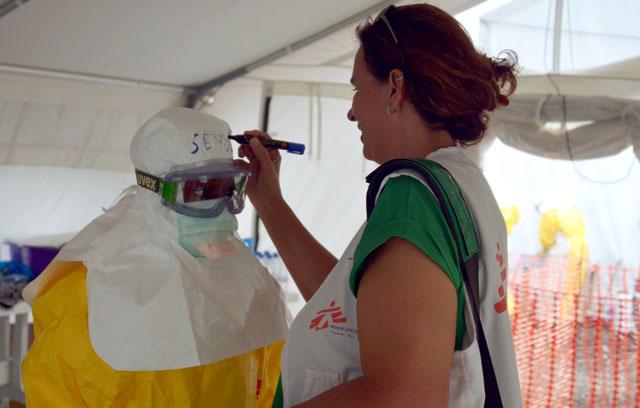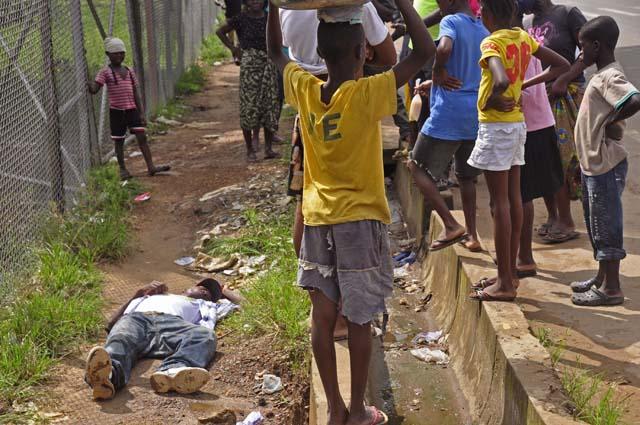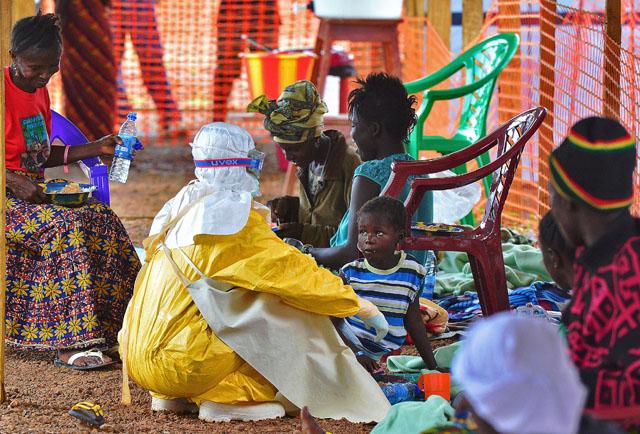You are here
West Africa seals off Ebola outbreak epicentre
By AFP - Aug 02,2014 - Last updated at Aug 02,2014

CONAKRY, Guinea — West Africa’s Ebola-hit nations announced a cross-border isolation zone on Friday, sealing off the epicentre of the world’s worst-ever outbreak as health chiefs warned the epidemic was spiralling out of control.
The announcement came at an emergency summit in the Guinean capital to discuss the outbreak, which has killed more than 700 people, with the World Health Organisation (WHO) warning Ebola could cause “catastrophic” loss of life and severe economic disruption if it continued to spread.
“We have agreed to take important and extraordinary actions at the inter-country level to focus on cross-border regions that have more than 70 per cent of the epidemic,” said Hadja Saran Darab, the secretary general of the Mano River Union bloc grouping the nations.
“These areas will be isolated by police and military. The people in these areas being isolated will be provided with material support,” she said at the meeting in Conakry.
The leaders of Sierra Leone, Liberia and Guinea used the summit to launch a $100 million (75 million euros) action plan which will see several hundred more medical staff deployed to battle the epidemic.
The three countries will also bolster efforts to prevent and detect suspected cases, urge better border surveillance, and reinforce the WHO’s sub-regional outbreak coordination centre in Guinea.
Darab did not outline the exact area to be part of the isolation zone, but the epicentre of the outbreak has a diameter of almost 300 kilometres, spreading from Kenema in eastern Sierra Leone to Macenta in southern Guinea, and taking in most of Liberia’s extreme northern forests.
“The healthcare services in these zones will be strengthened for treatment, testing and contact tracing to be carried out effectively,” she said.
‘Catastrophic loss of life’
Opening the summit, WHO chief Margaret Chan told leaders that the response of the three countries to the epidemic had been “woefully inadequate”, revealing that the outbreak was “moving faster than our efforts to control it”.
“If the situation continues to deteriorate, the consequences can be catastrophic in terms of lost lives but also severe socio-economic disruption and a high risk of spread to other countries,” Chan said.
She described the outbreak as “by far the largest ever in the nearly four-decade history of this disease”.
“It is taking place in areas with fluid population movements over porous borders, and it has demonstrated its ability to spread via air travel, contrary to what has been seen in past outbreaks,” she told the summit.
“Cases are occurring in rural areas which are difficult to access, but also in densely populated capital cities. This meeting must mark a turning point in the outbreak response.”
The meeting came after Dubai’s Emirates became the first global airline to announce it was suspending flights to the stricken area, while the United States, Germany, France and Italy have issued warnings against travel to the three African countries.
US President Barack Obama announced on Friday that the United States will screen delegates travelling from Ebola-hit countries to Washington for a three-day Africa summit next week.
Meanwhile Nigeria quarantined two people who had “primary contact” with a man who died of Ebola in Lagos last week.
The WHO raised the death toll by 57 to 729 on Thursday, announcing that 122 new cases had been detected between Thursday and Sunday last week, bringing the total to more than 1,300.
“Current numbers of national and international response staff are woefully inadequate,” Chan said, revealing that 60 health workers had died treating patients in the outbreak.
Sierra Leone’s leader Ernest Bai Koroma has announced a state of emergency, quarantining Ebola-hit areas and cancelling foreign trips by ministers, while Liberia has closed all of its schools and put government workers on leave.
Liberian President Ellen Johnson Sirleaf warned ahead of the summit that the crisis was “nearing a catastrophe” and appealed for more doctors and supplies.
Ebola, which has no vaccine, causes severe muscular pain, fever, headaches and, in the worst cases, unstoppable bleeding.
It has killed around two-thirds of those it has infected since its emergence in 1976, with two outbreaks registering fatality rates approaching 90 per cent.
The death rate in the current outbreak is a lower-than-average 55 per cent.
Fears that it could spread to other continents through air travel have been growing, with European and Asian countries on alert alongside African countries outside the Ebola crisis zone.
In Britain, Sierra Leone cyclist Moses Sesay was quarantined and tested for Ebola at the Commonwealth Games in Glasgow, before being given the all-clear, the athlete told a British newspaper.
Kenya, Ethiopia, Democratic Republic of Congo and Benin said they had enhanced screening at border points and airports.
Pan-African airlines Arik and ASKY have halted flights to and from Liberia and Sierra Leone, while Asia-Pacific nations from Hong Kong to Australia have announced tighter security measures at airports, some warning against travel to the Ebola-hit countries.
Related Articles
Aid agency Oxfam on Saturday said Ebola could become the "definitive humanitarian disaster of our generation", as US President Barack Obama urged against "hysteria" in the face of the growing crisis.
Liberia battled on Tuesday to halt the spread of the Ebola disease in its crowded, run-down oceanside capital Monrovia, recording the most new deaths as fatalities from the world's worst outbreak of the deadly virus rose above 1,200.
The Ebola epidemic is moving faster than the authorities can handle and could take six months to bring under control, the medical charity MSF said Friday.


















